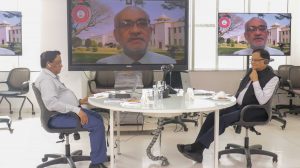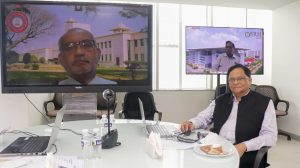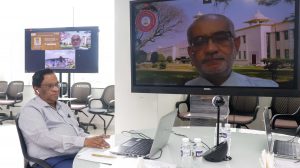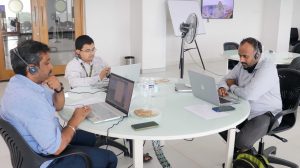Conference on Number Theory and Related Topics
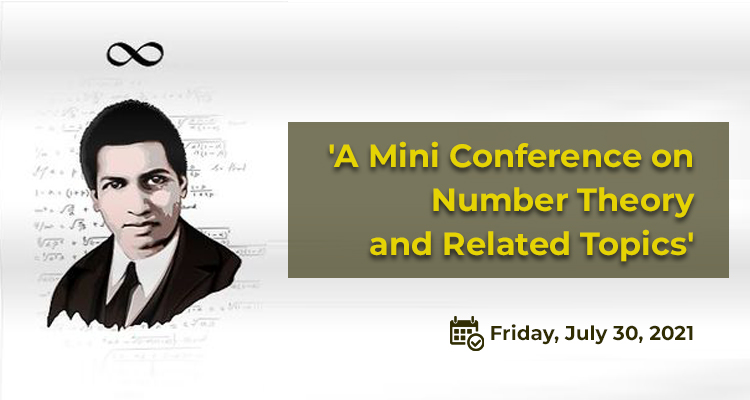 Department of Mathematics, SRM University-AP organised a 3-day conference on Number Theory and Related Topics. The Conference was scheduled for July 30 – August 01, 2021. Distinguished speakers from IMSC Chennai, CMI-Chennai, IIT-Kanpur, Ropar, Indore, Gandhinagar and Delhi, IISER-Bhopal, Pune and Tirupati, Charles University, Prague, University of Zagreb, RKMVERI, Belur took part in the Conference and presented their work and ideas on Number Theory.
Department of Mathematics, SRM University-AP organised a 3-day conference on Number Theory and Related Topics. The Conference was scheduled for July 30 – August 01, 2021. Distinguished speakers from IMSC Chennai, CMI-Chennai, IIT-Kanpur, Ropar, Indore, Gandhinagar and Delhi, IISER-Bhopal, Pune and Tirupati, Charles University, Prague, University of Zagreb, RKMVERI, Belur took part in the Conference and presented their work and ideas on Number Theory.
Modern number theory is connected with almost every other branch of mathematics. This Conference is dedicated to exploring different aspects of modern number theory, including modular forms, automorphic forms, representation theory, arithmetic geometry, special functions, diophantine approximations, quadratic forms etc. This Conference aims to encourage young aspiring mathematicians to get a flavour of the broad horizon of number theory.
For more information and to watch the lecture videos, please visit this site.
SRM University-AP develops sustainable transparent “biofilm” to replace plastic cuvettes
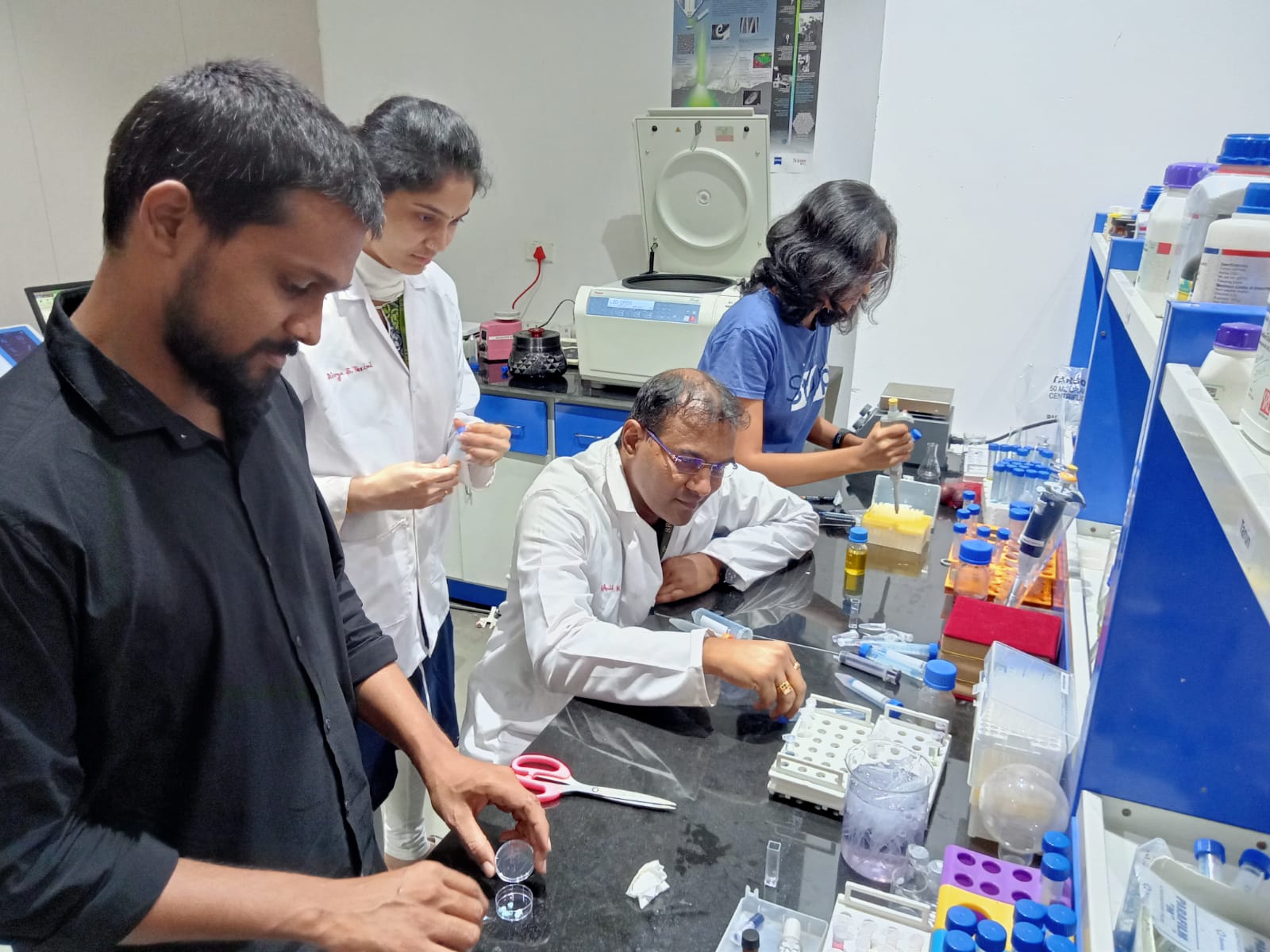 Dr Anil K Suresh, Associate Professor, Department of Biological Sciences, and his team from SRM University-AP recently developed a see-through transparent (with 85% above transmittance) biotemplate which they derived from the fish scale wastes to substitute the extensive usage of eco-unfriendly disposal plastic cuvettes for UV-Visible Spectroscopy measurements in the spectrum of 350-900 nm. UV-Vis spectroscopy is a versatile analytical tool used to examine the nature of various synthetic, biological and clinical molecules for pharmaceutical and environmental applications. The team members demonstrated the practical on-biotemplate analysis of diverse analytes such as DNA, proteins, nanoparticles, organic dyes, bacteria, BSA assay and dye-degradations.
Dr Anil K Suresh, Associate Professor, Department of Biological Sciences, and his team from SRM University-AP recently developed a see-through transparent (with 85% above transmittance) biotemplate which they derived from the fish scale wastes to substitute the extensive usage of eco-unfriendly disposal plastic cuvettes for UV-Visible Spectroscopy measurements in the spectrum of 350-900 nm. UV-Vis spectroscopy is a versatile analytical tool used to examine the nature of various synthetic, biological and clinical molecules for pharmaceutical and environmental applications. The team members demonstrated the practical on-biotemplate analysis of diverse analytes such as DNA, proteins, nanoparticles, organic dyes, bacteria, BSA assay and dye-degradations.
Dr Anil claims that the large-scale development of the biotemplate can resolve several issues in performing sustainable research; for instance, generates huge demand for fish scales as a resource stratagem otherwise causative of foul smell and disease propagation when discarded. Second, the use of non-biodegradable plastic cuvettes can be minimized for routine analytics and third, unlike plastic cuvettes that demand 500-fold analyte our biotemplate allows the analysis at a very low 10 microlitre volumes, making it feasible to analyse expensive, rare, and high-risk analytes. Dr Anil K Suresh owns the copyrights for this pathbreaking invention by being granted an Indian patent. This work is accepted for publication in the prestigious Journal of “Green Chemistry” by the Royal Society of Chemistry. Read the full paper here.
Adding to the mechanistic, Dr Anil said, “naturally acquired droplet retaining ability for over 30 minutes against gravity while vertically positioning the biotemplate supported such ultra-low volume measurements and monitoring of chemical reactions in-situ”. Interestingly, the same ability allows the retrieval of the analytes after completion of the analysis, crucial for precious analytes. Dr Anil says the best part is that the transparent biotemplate can be discarded back into the environment post-usage without any hesitation as the biotemplate is completely biodegradable.
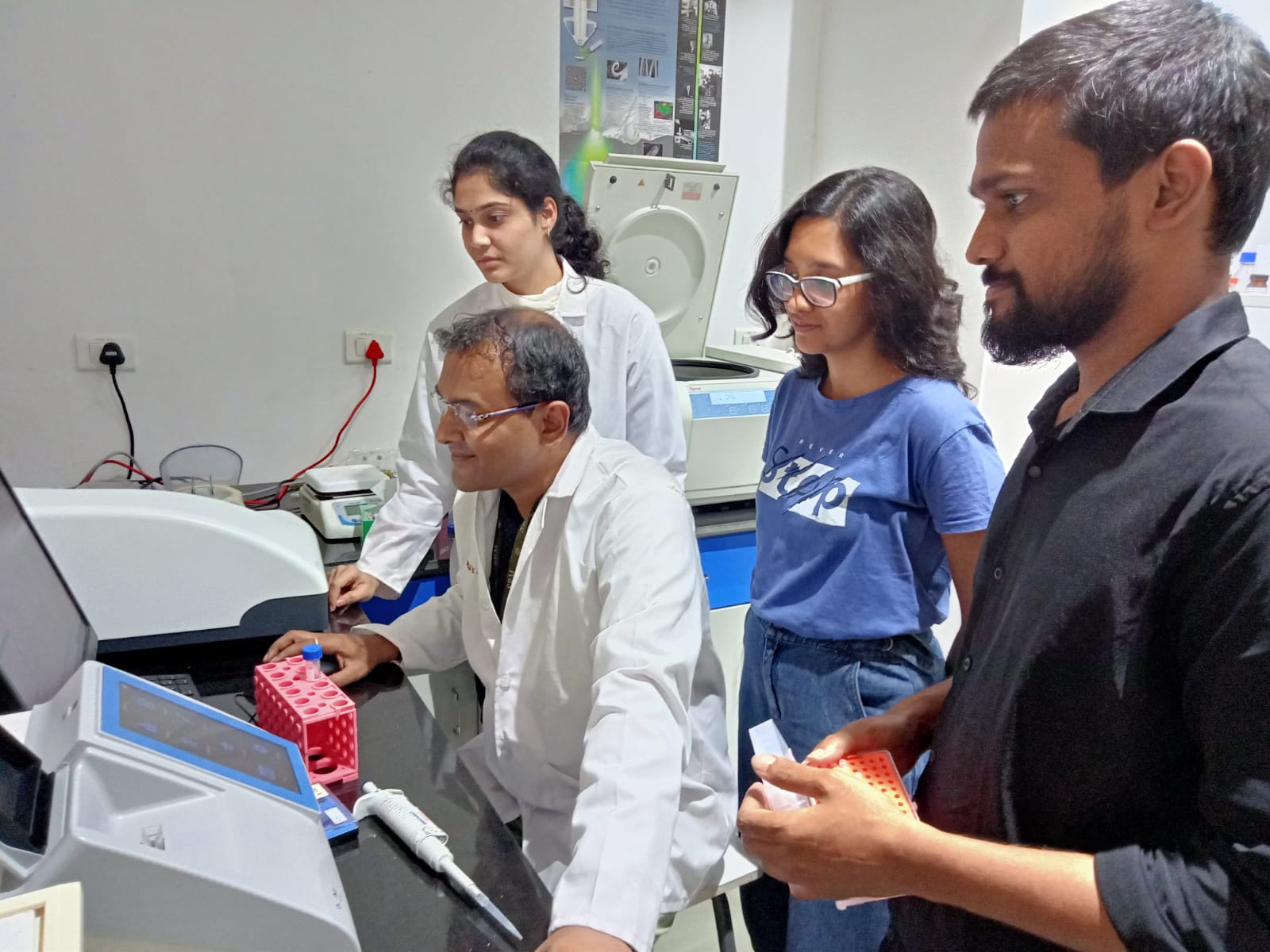
Further, the research group demonstrated ease in large-scale production by generating ~3000 bio templates at an affordable price. Dr Anil emphasised that this low-cost, plastic-free, use-and-throw biodegradable transparent biotemplate stemmed from food waste as a bioresource stratagem has huge potential in routine scientific and pharma UV-Vis analytics and he will very soon bring this product to the scientific community as a sustainable science solution.
Dr Anil Suresh concluded that this breakthrough conception would not have been possible without the rigorous efforts of his team and the continuous support from the university management, who are also encouraging and willing to support Dr Anil to establish his own start-up within the University. Dr Anil Suresh thanked his group members Ms Divya Parimi, Mr Chandra Bhatt, Mr Tharun Bollu and Ms Madhura, his collaborators Dr Malli and Mr Jacob. Dr Anil’s team especially thanked the management of SRM University-AP; the President Dr P. Sathyanarayanan for his generous support, Prof D Narayana Rao, Pro-Vice-Chancellor for his constant untiring encouragement, motivation and support in all his scientific endeavours, and the Vice-Chancellor Prof V S Rao for his kind support.
- Published in Biology News, Departmental News, News, Research News, Students Achievements
University of California, Davis and SRM University-AP ink MoU for Global Study Programme
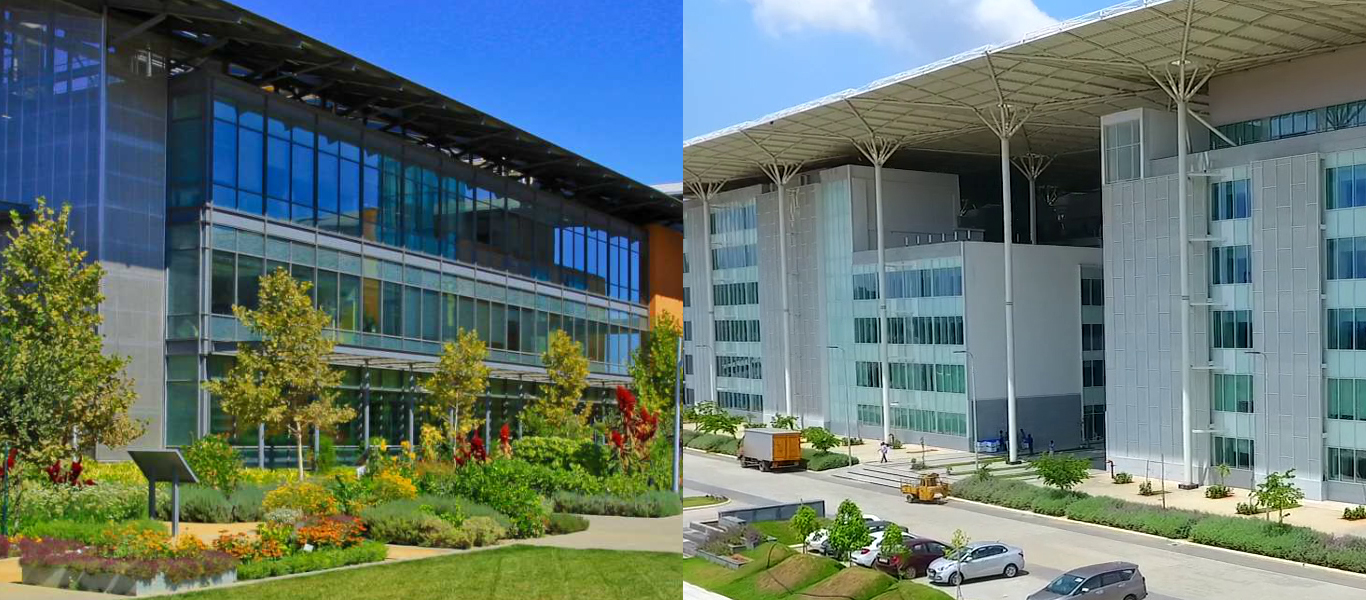 SRM University – AP enters into an MoU with the University of California, Davis for common interests and objectives in academic, scientific, and cultural affairs. Our university will select meritorious students with high academic standing and demonstrated skills for University-level study in English for the Global Study Programme. Prof Y Sivasankar from the Department of Electronics and Communications Engineering will act as the nodal faculty establishing channels of communication to facilitate intellectual interaction.
SRM University – AP enters into an MoU with the University of California, Davis for common interests and objectives in academic, scientific, and cultural affairs. Our university will select meritorious students with high academic standing and demonstrated skills for University-level study in English for the Global Study Programme. Prof Y Sivasankar from the Department of Electronics and Communications Engineering will act as the nodal faculty establishing channels of communication to facilitate intellectual interaction.
The Global Study Programme will enable students to enrol in courses at UC Davis for academic credit that will be applied towards the degree the student is earning at SRM University-AP. Students will be able to enrol in a broad range of courses in nearly all the colleges and departments in UC Davis. They will be provided with access to UC Davis facilities and privileges, including but not limited to: libraries, sports, and recreational facilities, the university transportation system, and the student health centre. Moreover, students will be assisted to obtain housing within a reasonable distance of the UC Davis campus.
The MoU provides a framework for students from SRM University-AP to study at UC Davis under the auspices of the Global Study Programme. The UC Davis Global Study Programme is an academic study programme that allows students from select foreign institutions to enrol in regular UC Davis courses on a full-time, non-degree basis. SRM University-AP initiates global partnership with reputed international universities to facilitate the academic and cultural enrichment of our students which in turn adds to their personal and professional growth.
- Published in Collaborations, News
Integration of Science, Engineering and Technology is the key to sustainable development
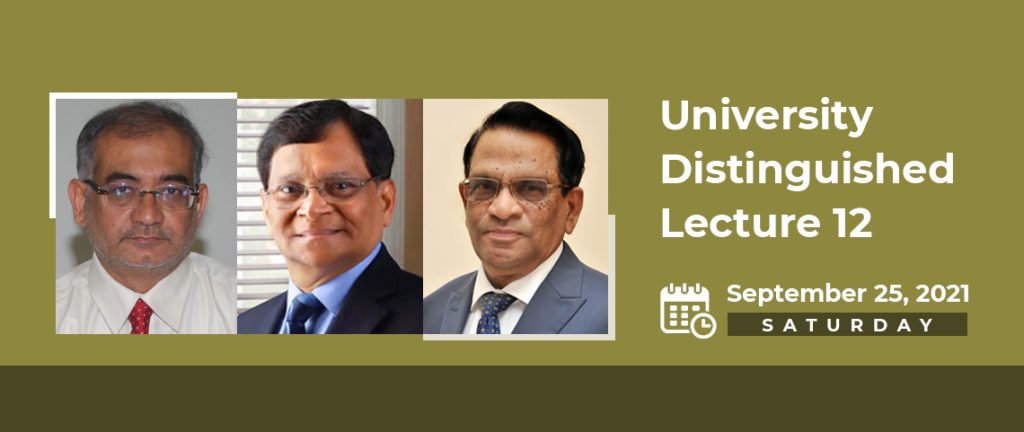 The 12th edition of the widely popular University Distinguished Lecture Series delved into the pertinent relationship between Science, Engineering and Technology. During the distinguished lecture, “Science-Engineering-Technology Synergy for Sustainable Growth”, Prof Indranil Manna well explained the correlation between the streams and how scientists, engineers and industry experts should work together for maximum societal benefits. Prof Indranil Manna, a JC Bose fellow of DST, is currently the Vice-Chancellor of BIT Mesra. The event took place on September 24, 2021, in virtual mode.
The 12th edition of the widely popular University Distinguished Lecture Series delved into the pertinent relationship between Science, Engineering and Technology. During the distinguished lecture, “Science-Engineering-Technology Synergy for Sustainable Growth”, Prof Indranil Manna well explained the correlation between the streams and how scientists, engineers and industry experts should work together for maximum societal benefits. Prof Indranil Manna, a JC Bose fellow of DST, is currently the Vice-Chancellor of BIT Mesra. The event took place on September 24, 2021, in virtual mode.
In his address, Prof Indranil Manna asserted that India is no longer a poor country but a mighty economic power with a 3 trillion dollar economy. “We are considered as one of the strongest nations of the world today, not because of the population or because of the youth living in the country, but we are the ones who could send mission to mars at the cheapest cost, and also successfully identified the existence of water on the surface of the moon. Further, we are one of the very few nuclear harnessing nations of the world,” said Prof Manna.
Science began its journey in order to find out the truths of nature. “Why?”- this question is the driving force behind Science. Though Science unravels nature and truth primarily through curiosity or need inspired acts, and the occasional outcome is significant earth-breaking discoveries, sometimes it needs technology to prove it. On the other hand, Engineering deals with “How?” and for Technology, the question is “What?”. Engineering produces certain products and devices by specific designs and inventions. However, what is absolutely essential for the society is Technology, knowledge through the path of knowing ‘why’ and ‘how’ to know ‘what’ sells. Thus, Prof Manna prescribes SET, a conjugation of Science+Engineering+Technology, as the way forward for maximum societal benefits.
Prof Manna explained that innovation means new ideas, creative thoughts, new imaginations in the form of a device or method. It is incremental, cross-disciplinary, directed and translational. Innovation matures itself via Engineering or Technological interventions. Further, sustainability is a composite concept that means the ability to maintain the desired rate or level, avoiding depletion of resources, energy or disturbing the related ecosystem.
Engineering and Technology are the key factors to sustainability. Engineers are not technicians meant only for routine production, maintenance or testing. Instead, Engineering applies the principles of science and logic to develop viable solutions to societal aspirations and challenges. The core of engineering lies in the translation, fundamental concepts to design, develop, fabricate, exploit, analyse, model, stimulate and predict,” Prof Manna elaborated.
Government of India’s Technology Vision-2035 focuses on developing the quality of life of each Indian. Science is pursuing the truth relentlessly regardless of its necessity or immediate scope of application. It provides clues, if not answers and extends as far as imagination goes. Engineering is all about enabling and providing solutions borrowing from the fundamentals of science. Technology is the last mile for societal benefit, based on scientific discovery and engineering inventions and innovations.
India is a great innovator and showcasing continuous gradual progress in it. In the Global Innovation Index (GII), India ranks 48 (2020), making it into the top 50 for the first time. Prof Manna believes that India has enough talent and potential to make it into the top 10. “Let us ensure that Science-Engineering-Technology in India complement each other and flourish together so that our society soon achieves the desired culture, growth and prosperity,” Prof Manna Concluded.
In his welcome address, Prof D Narayana Rao, Pro-Vice-Chancellor, SRM University-AP, said that the development and use of Science & Technology are critical for the achievement and sustenance of various sectors. The importance of Science and Technology to modern society and the role of the technologically educated population in promoting social and environmental developments have long been recognised. Science and technology are considered the most effective means to enhance the growth and socio-economic developments of nations. Moreover, the universalism of science and the globalisation of technological production and trade offer unprecedented opportunities for focused cooperation for scientists, engineers and the institutions that employ them to further progress in sustainable development. Even, National Education Policy-2020 advocated multidisciplinary, multi-institutional research for sustainable development.
In his concluding remarks, Prof V S Rao, Vice-chancellor, SRM University-AP, congratulated Prof Indranil Manna on delivering such a motivating lecture. He further honoured him by presenting a memento.
- Published in News, Research Events, Research News, University Distinguished Lecture


